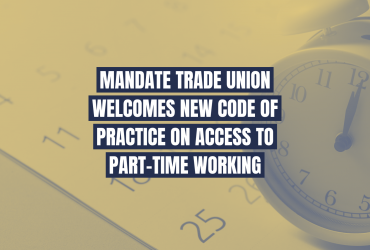Taking a stand and making labour history
Monday 30 June 2014THREE shopworkers involved in one of the most famous labour actions in Irish history – the Dunnes Stores strike of the mid-1980s – spoke at a special event organised by Trocaire earlier this year in Belfast.
Cathryn O’Reilly, Liz Deasy and Tommy Davis were interviewed by broadcaster Seamus McKee at The Black Box venue on March 27 and recalled their experiences of taking part in the action along with nine other colleagues over their refusal to handle goods imported from Apartheid South Africa.
It all began on July 19, 1984, when Mary Manning, a 21-year-old shop worker at the Dunnes outlet in Henry Street. Dublin, refused to check out two oranges from South Africa.
She had simply been following an instruction issued by her union IDATU (forerunner to Mandate) but it led to her suspension and sparked a strike which was to last for two-and-a-half years and lead ultimately to an import ban on Apartheid-era South African produce to the Republic.
“To us it was a work instruction,” Cathryn recalls about joining the strike. She was simply doing what her trade union had instructed her to do. She admits at the time she did not know a great deal about the situation in South Africa, though that was to change as the dispute continued.
In particular, Cathryn remembers the support the strikers received from Marius Schoon, a Dublin-based white South African and anti-Apartheid activist.
Marius had suffered a recent tragedy – he had lost his wife Jeannette Curtis and six-year-old daughter Katryn in a letter bomb attack.
“Marius had lost his wife and his daughter – and he was thanking us for going on strike,” adds Cathryn.
Liz, who was only 17 and working part-time in her first job, remembers the moment she decided to join the dispute. “The girls were in the changing room waiting to go out on strike. I told them, ‘I have to go with you. It’s a union instruction’. At the time, I was only in the union about eight months. I thought it would last the weekend – and it was such a lovely weekend!”
For Tommy, who was in a different union from the others, it was clear what had to be done.
“Once I was told there was a picket line, that was it. You don’t cross a picket line.”
Joining the dispute, of course, meant sacrifices for those taking part.
“We didn’t receive pay,” Cathryn recalls. “We got £21 a week from our trade union – our pay had been about £90 a week.
“It was very difficult. One of the girls on the strike lost her home. She couldn’t afford to pay her mortgage. People did make huge personal sacrifices.
“We were so in awe of what Marius said to us. We were very lucky. We still had our families to support us. We might not have had all the luxuries but our families stood behind us.” Liz agrees. “People like Marius and Nimrod [Sejake] – they played a major part in educating us.”
Some employees opted not to join the dispute and Cathryn, who had worked full-time before the strike, remembers colleagues “who would have been friends” walking past her as she stood on the picket line into work.
She also recalls how the reaction of passers-by wasn’t always positive.
“We had a delegation of white South Africans who came down when the strike was only a few days old. They told us that we had it wrong and that black people liked living in squalor.
“They told Mary Manning she didn’t know what she was talking about and she replied, ‘I didn’t know Hitler but I knew he was a bad man’ and they went on their way.”
“People were coming to us to coerce us back into returning to work,” adds Tommy. “They were saying if you don’t return you’ll get sacked.”
Though some people walked past the Henry Street picket waving pay cheques, Cathryn also remembers the generous donations that warmed the hearts of strikers in the depths of winter.
“There was one anonymous donor – I can’t remember the exact amount – but it was quite near Christmas and he came up and he gave an envelope [with cash] to every one of us.”
She adds: “It got to the stage that we got to know better about the struggle in South Africa. The money bit really was irrelevant. You had such a passion and you wanted to get people involved – the money was secondary.”
Tommy also spoke about how strikers had to deal with “ongoing constant harassment” from Special Branch officers.
He explains: “There was harassment by the Branch. We finished about six o’clock to go home with some of the placards. They would stop the car and ask ‘Who are you?’ and there was verbal abuse from Branch officers, calling you ‘n***er lover’ and ‘black supporter’.”
And when ICTU asked other unions not to allow their members to deliver produce to the store, management went to great lengths to ensure shelves were restocked – but the strikers found a new use for their placards!
Cathryn remembers: “We stood up on the ledge and put up our placards as they tried to throw the stuff over our picket line!”
In 1985, eight of the strikers along with their union official, Brendan Archbold of IDATU, flew to South Africa at the special invitation of Bishop Desmond Tutu.
The strike delegation was not allowed to enter the country but and its members held under armed guard in Johannesburg Airport.
Of that incident, which made headlines across the world, Liz remembers the “line of army along the road to the airport” as their plane came in to land.
She says: “We initially thought this was a normal procedure, but when we got into the terminal, there was a soldier, like a sergeant major, who asked us to stand aside…”
Cathryn adds: “At one time we had 32 armed guards surrounding us. There were no direct flights from Dublin so we had to fly from Heathrow. People were very hostile to us on that plane.
“We were very young and the guards had dark gloves on and we thought that they might strip-search us. Nobody knew where we were because as far as our families were concerned we were still in Heathrow.
“They didn’t tell us what they were going to do with us. There was a state of emergency at the time and people were disappearing left, right and centre. It was a terrifying experience especially when we were surrounded by all those soldiers. We thought, ‘When are we going to see our families again’?” The South African government decided to rid themselves of the problem and put the strike delegation back on the plane to the UK.
“As soon as we got back,” Tommy adds, “we all went to the picket line again. We got more support by not getting into South Africa. It was international news at the time.
“As soon as we got back to Dublin, we got all walks of life down on the picket line – union leaders, [Nobel Prize winner] Sean McBride…”
Some 27 years after the protest ended, does Tommy have any regrets?
Not surprisingly, none.
He says: “I would do it again if I was younger. There is oppression going on all about the place. I am glad I played a part in it. I am glad I did what I did.”
This article is taken from Mandate’s Shopfloor magazine. You can view an online version of the publication here.






